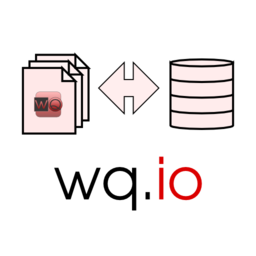Consistent iterable API for reading and writing to external datasets
Project description
wq.io is a collection of Python libraries for consuming (input) and generating (output) external data resources in various formats. It thereby facilitates interoperability between the wq framework and other systems and formats.
Getting Started
pip install wq.io
# Or, if using together with wq.app and/or wq.db
pip install wq
# To use wq.io's GIS capabilities also install Shapely and Fiona
pip install shapely fionaSee the documentation for more information.
Features
The basic idea behind wq.io is to avoid having to remember the unique usage of e.g. csv, xlrd, or lxml every time one needs to work with an external dataset. Instead, wq.io abstracts these libraries into a consistent interface that works as an iterable of namedtuples. The field names for a dataset are automatically determined from the source file, e.g. the column headers in an Excel spreadsheet.
from wq.io import load_file
data = load_file('example.xls')
for row in data:
print row.name, row.dateWhen fiona and shapely are available, wq.io can also open and create shapefiles and other OGR-compatible geographic data formats.
from wq.io import ShapeIO
data = ShapeIO(filename='sites.shp')
for id, site in data.items():
print id, site.geometry.wktIt is straightforward to extend wq.io by subclassing existing functionality with custom implementations.
Project details
Release history Release notifications | RSS feed
Download files
Download the file for your platform. If you're not sure which to choose, learn more about installing packages.












